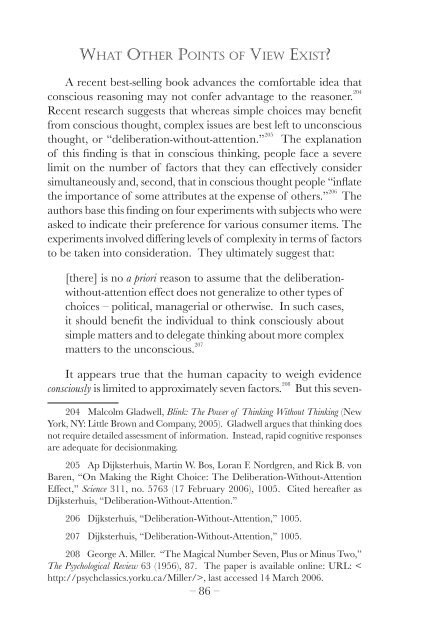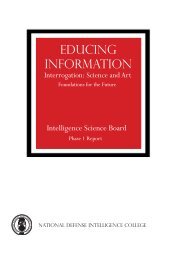Critical Thinking and Intelligence Analysis
Critical Thinking and Intelligence Analysis
Critical Thinking and Intelligence Analysis
You also want an ePaper? Increase the reach of your titles
YUMPU automatically turns print PDFs into web optimized ePapers that Google loves.
What Other Points of View Exist<br />
A recent best-selling book advances the comfortable idea that<br />
conscious reasoning may not confer advantage to the reasoner. 204<br />
Recent research suggests that whereas simple choices may benefit<br />
from conscious thought, complex issues are best left to unconscious<br />
thought, or “deliberation-without-attention.” 205<br />
The explanation<br />
of this finding is that in conscious thinking, people face a severe<br />
limit on the number of factors that they can effectively consider<br />
simultaneously <strong>and</strong>, second, that in conscious thought people “inflate<br />
the importance of some attributes at the expense of others.” 206<br />
The<br />
authors base this finding on four experiments with subjects who were<br />
asked to indicate their preference for various consumer items. The<br />
experiments involved differing levels of complexity in terms of factors<br />
to be taken into consideration. They ultimately suggest that:<br />
[there] is no a priori reason to assume that the deliberationwithout-attention<br />
effect does not generalize to other types of<br />
choices – political, managerial or otherwise. In such cases,<br />
it should benefit the individual to think consciously about<br />
simple matters <strong>and</strong> to delegate thinking about more complex<br />
matters to the unconscious. 207<br />
It appears true that the human capacity to weigh evidence<br />
consciously is limited to approximately seven factors. 208<br />
But this seven-<br />
204 Malcolm Gladwell, Blink: The Power of <strong>Thinking</strong> Without <strong>Thinking</strong> (New<br />
York, NY: Little Brown <strong>and</strong> Company, 2005). Gladwell argues that thinking does<br />
not require detailed assessment of information. Instead, rapid cognitive responses<br />
are adequate for decisionmaking.<br />
205 Ap Dijksterhuis, Martin W. Bos, Loran F. Nordgren, <strong>and</strong> Rick B. von<br />
Baren, “On Making the Right Choice: The Deliberation-Without-Attention<br />
Effect,” Science 311, no. 5763 (17 February 2006), 1005. Cited hereafter as<br />
Dijksterhuis, “Deliberation-Without-Attention.”<br />
206 Dijksterhuis, “Deliberation-Without-Attention,” 1005.<br />
207 Dijksterhuis, “Deliberation-Without-Attention,” 1005.<br />
208 George A. Miller. “The Magical Number Seven, Plus or Minus Two,”<br />
The Psychological Review 63 (1956), 87. The paper is available online: URL: <<br />
http://psychclassics.yorku.ca/Miller/>, last accessed 14 March 2006.<br />
– 86 –
















